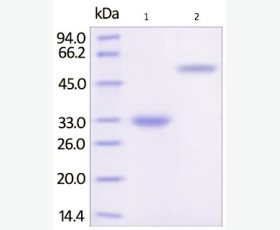Recombinant Human Cystatin C/CST3
| Product name: | Recombinant Human Cystatin C/CST3 |
| Source: | Human Cells |
| Purity: | Greater than 95% as determined by reducing SDS-PAGE. |
| Buffer Formulation: | Lyophilized from a 0.2 μm filtered solution of 10mM PB, 200mM Nacl, pH6.5. |
| Applications: | Applications:SDS-PAGE; WB; ELISA; IP. |
| Storage: | Avoid repeated freeze/thaw cycles. Store at 2-8 oC for one month. Aliquot and store at -80 oC for 12 months. |
| UOM: | 100ug/50ug/200ug/1mg/1g |
SourceHuman CellsDescriptionRecombinant Human Cystatin C is produced by our Mammalian expression system and the target gene encoding Ser27-Ala146 is expressed.NamesCystatin-C;Cystatin-3;Gamma-trace;Neuroendocrine basic polypeptide;Post-gamma-globulin;CST3Accession #P01034FormulationLyophilized from a 0.2 μm filtered solution of 10mM PB, 200mM Nacl, pH6.5.ShippingThe product is shipped at ambient temperature.
ReconstitutionAlways centrifuge tubes before opening. Do not mix by vortex or pipetting.
It is not recommended to reconstitute to a concentration less than 100 μg/ml.
Dissolve the lyophilized protein in ddH2O.
Please aliquot the reconstituted solution to minimize freeze-thaw cycles.StorageLyophilized protein should be stored at < -20°C, though stable at room temperature for 3 weeks.
Reconstituted protein solution can be stored at 4-7°C for 2-7 days.
Aliquots of reconstituted samples are stable at < -20°C for 3 months.PurityGreater than 95% as determined by reducing SDS-PAGE.
EndotoxinLess than 0.1 ng/µg (1 IEU/µg) as determined by LAL test.Amino Acid Sequence
ReconstitutionAlways centrifuge tubes before opening. Do not mix by vortex or pipetting.
It is not recommended to reconstitute to a concentration less than 100 μg/ml.
Dissolve the lyophilized protein in ddH2O.
Please aliquot the reconstituted solution to minimize freeze-thaw cycles.StorageLyophilized protein should be stored at < -20°C, though stable at room temperature for 3 weeks.
Reconstituted protein solution can be stored at 4-7°C for 2-7 days.
Aliquots of reconstituted samples are stable at < -20°C for 3 months.PurityGreater than 95% as determined by reducing SDS-PAGE.
EndotoxinLess than 0.1 ng/µg (1 IEU/µg) as determined by LAL test.Amino Acid Sequence
SSPGKPPRLVGGPMDASVEEEGVRRALDFAVGEYNKASNDMYHSRALQVVRARKQIVAGVNYFLD VELGRTTCTKTQPNLDNCPFHDQPHLKRKAFCSFQIYAVPWQGTMTLSKSTCQDA
BackgroundCystatin C is a member of family 2 of the cystatin superfamily. It is ubiquitous in human tissues and body fluids and mainly used as a biomarker of kidney function. Cystatin C inhibits many cysteine proteases such as papain and Cathepsins B, H, K, L and S. As an inhibitor of cysteine proteinases, Cystatin C is thought to serve an important physiological role as a local regulator of this enzyme activity. Recently, it has been studied for its role in predicting new-onset or deteriorating cardiovascular disease. It also seems to play a role in brain disorders involving amyloid (a specific type of protein deposition), such as Alzheimer's disease.













